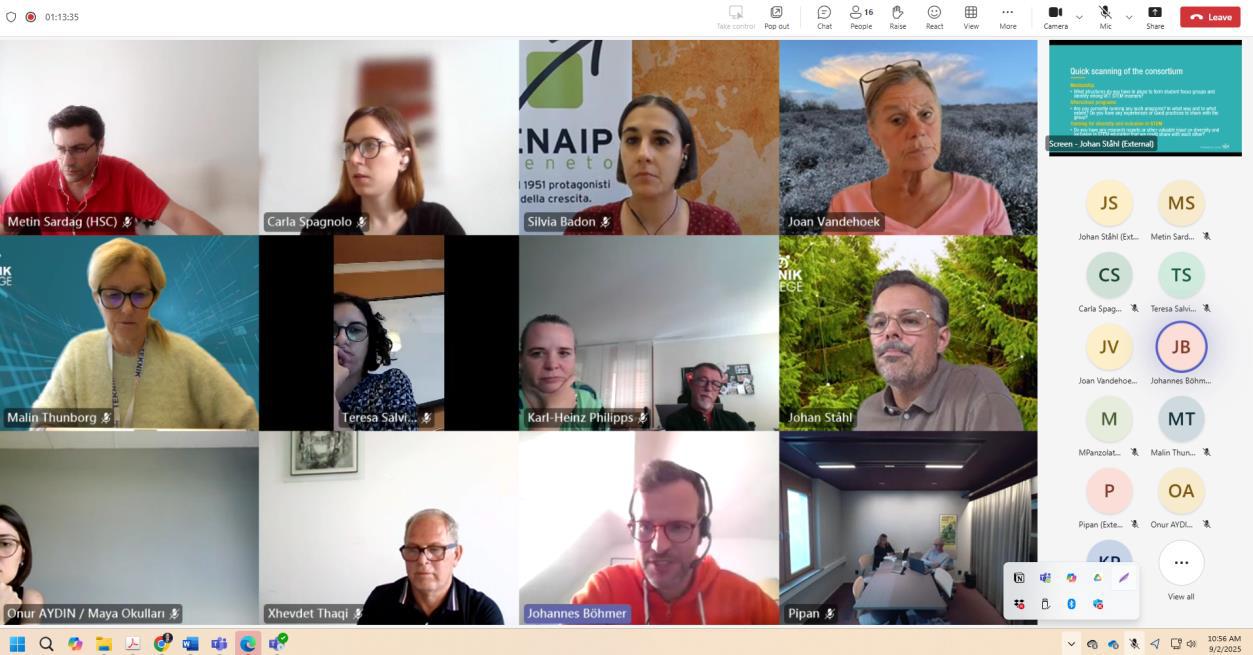WP3 Kick-off online meeting
Project: CoVE STEM EUROPE
Date: 02 September 2025
Location: Microsoft Teams – (Online Meeting)
Organized by: Teknikcollege -Johan Ståhl (WP3 Leader)
-----------------------
On 02 September 2025, the kick-off meeting for Work Package 3 (WP3) of the CoVE STEM EUROPE project took place. The important Work Package 3, within CoVE STEM EUROPE Project, aims to empower students and educators in STEM education and career pathways by fostering an open-source knowledge-sharing environment and a micro-learning community approach that adapts to local needs and fosters an open-source environment for sharing knowledge.

Photo during the on-line meeting
The meeting was attended by representatives of Project Partners from:
- Turkey
- Germany
- Italy
- The Netherlands
- Kosovo, and
- Sweden
Participants included representatives from educational institutions, Centres of Vocational Excellence (CoVEs), and industry stakeholders, highlighting a strong commitment to diversity and inclusion in STEM education.
Agenda Highlights
The meeting introduced Project Overview, WP3 principles and Frameworks, key tasks, and deliverables. Participants presented their roles and commitments to the project, emphasizing collaboration to foster diversity, attractiveness, and engagement in STEM education.
WP3 focuses on three main interconnected tracks and a training component:
- Mentorship Framework & Program
- Campaign for STEM Attractiveness
- After-School Engagement Program
- Training to Increase Diversity and Inclusion in STEM Education
The meeting emphasized the importance of a micro-learning community approach, which allows partners to adapt activities to local needs while fostering an open-source environment for sharing both best and challenging practices. WP3 builds on four key pillars: a mentorship program, a campaign to raise the attractiveness of STEM, an after-school engagement program, and training for diversity and inclusion in vocational education and training.
Discussions highlighted the mentorship program as a central element, with guidelines and an implementation plan to be finalized by early 2026. Each regional consortium will identify mentors to engage with schools and students, aiming to make STEM more accessible and attractive. Closely linked to this initiative is a campaign that will include the production of promotional videos. Questions were raised around mentor selection criteria and the use of AI-based tools for multilingual accessibility.
The after-school engagement program was another key topic, with partners sharing experiences on how to involve students outside regular curricula. Flexibility in timing and strong collaboration with schools and industry were identified as essential factors for success. In parallel, the discussion on diversity and inclusion underlined the need to better reach underrepresented groups, with ongoing research and best practices from different regions expected to feed into the design of training materials and guidelines.
To ensure smooth progress, the consortium agreed on a set of follow-up actions, including developing the mentorship framework, sharing research inputs on diversity, and holding monthly coordination meetings throughout 2025. The meeting concluded with a strong sense of commitment to building a more inclusive, engaging, and sustainable STEM education ecosystem across Europe.
 Formerly co-funded by the Erasmus+ Programme of the European Union
Formerly co-funded by the Erasmus+ Programme of the European Union